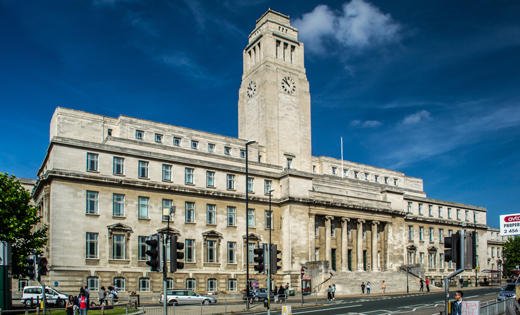
WRDTP 8th Annual Conference
The White Rose Doctoral Training Partnership holds its 8th Annual Conference at the University of Leeds on the 19 June 2019. The conference is a great opportunity to network with other doctoral researchers, share your research experiences, find out more about the training on offer from the DTP Pathways and meet your Pathway Director.
The theme for this year’s conference is ‘The Sustainable Development Goals.’
The Sustainable Development Goals set us a challenge to solve the world’s wicked problems, from inequality to climate change, ageing populations to education for all. How do we provide meaningful and long lasting solutions to the world’s most pressing challenges? Join us for the White Rose Social Sciences Doctoral Training Partnership annual conference on 19 June, where we will explore the role of social science research in local and global transformation.
What are the Sustainable Development Goals?
The Sustainable Development Goals are a collection of 17 Global goals set by the United Nations General Assembly in 2015. They address the global challenges we face, including those related to poverty, inequality, climate, environmental degradation, prosperity, and peace and justice.
Conference Speakers
In the morning, there will be a ‘Question Time’ style Panel of Researchers and academics who have experience in conducting research in and securing grant funding related to the Sustainable development Goals. They are:

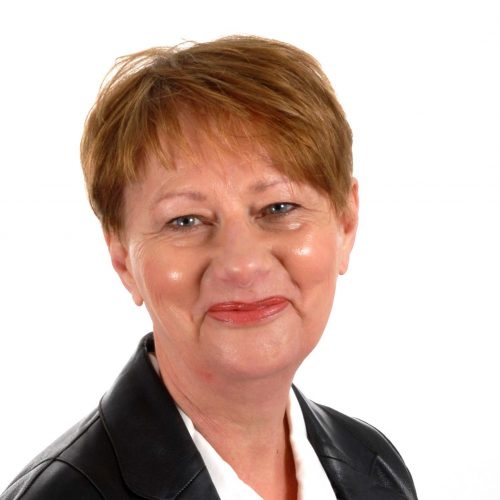
In York, she is a member of the University GCRF Steering Group and the Research Communications Strategy Group and is chair of the Research Communications Operations Committee. Recent publications include Demanding Human Rights in the Global South (edited) Palgrave-Macmillan, London and The Handbook of International Development (edited) Palgrave-Macmillan, London and articles in Development and Change, World Development, Human Rights Quarterly, Development Policy Review, Citizenship Studies and International Affairs.
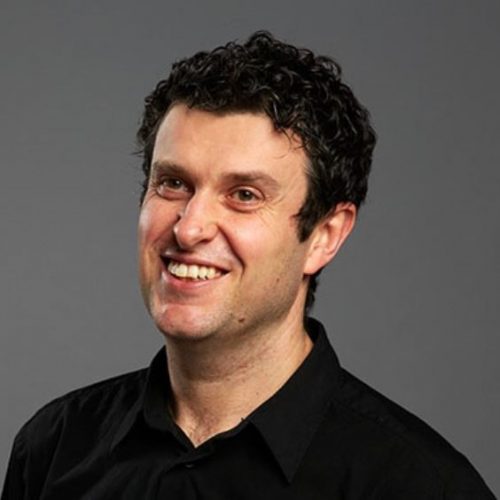
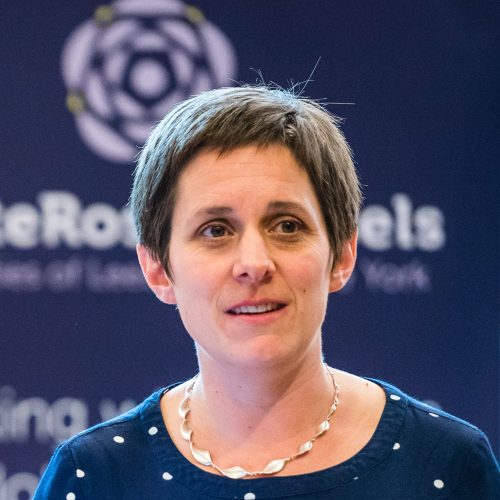
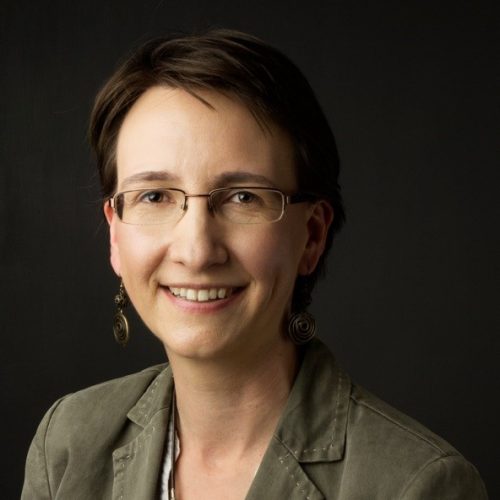
Her key research interests are:
Sustainable and just development futures in the global South (and North)
Information and communication technologies for development (ICT4D)
Ethics of ICT-related development interventions, responsible innovation and data ethics
The capabilities approach and sustainable development
Sustainable/ethical consumption research, food geographies, trade justice and Fair Trade
Themes such as participation, gender, justice and choice run strongly through her work. She has conducted research in Latin America (Brazil; Chile), Europe (UK, Germany), South Asia (India) and Africa (Kenya; South Africa).
Dorothea is strongly committed to research which is both academically excellent and can have a positive impact in the context of the global challenges we face today. Thus her work includes participatory action research in partnership with local communities and marginalised groups, theoretical reflections on the need to redefine “development”, evaluation of NGO programmes, as well as international keynotes, scientific advisory roles and speaking at global policy conferences.
Before joining Sheffield in September 2016, Dorothea held posts at Royal Holloway, University of London, the University of Cambridge and Bonn University. Educated at the University of Munich (LMU and TUM) and the University of Oxford, she holds a PhD from the London School of Economics and Political Science. She is a Faculty Associate at Harvard University’s Berkman Center for Internet and Society. Dorothea has conducted collaborative research with and/or advised UNICEF, UNEP, EuropeAid, DFID, GIZ, IDRC, private sector organisations and NGOs.
Programme
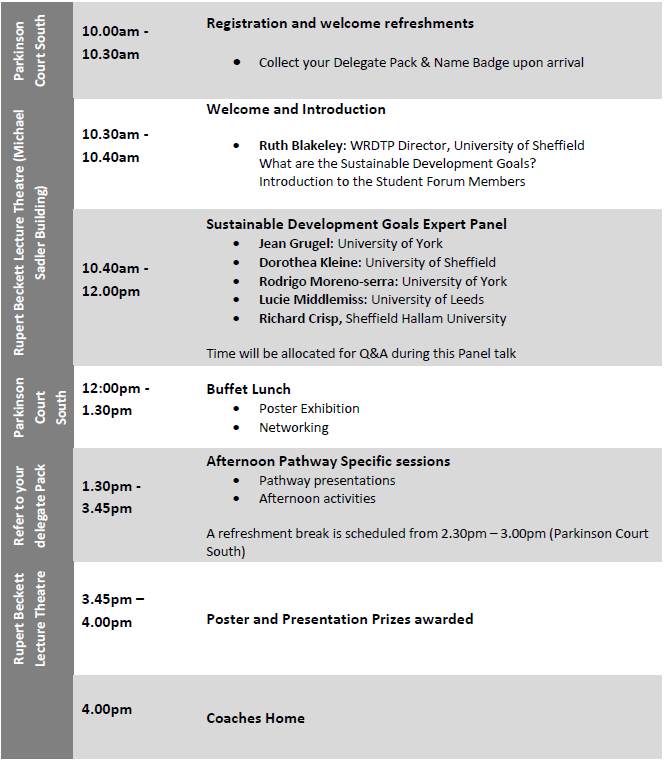
Well-being, Health and Communities (WHC) Pathway afternoon session
Presentations
Danielle BEATON: ‘What is the function of self-compassion in the relationship between Attention Deficit-Hyperactivity Disorder (ADHD) and mental health?’
Samiha MIRZA: ‘A systematic review on measurement properties of an observational tool (Infant CARE-index) used to assess the parent-infant interactions from birth up to 15 months’
Tyler MILLS: ‘Exploring Masculinities in Transgender Men’
Natalie BENNETT: ‘The ‘ethnic density effect’ in the UK: what are the pathways to mental health?’
Emily GAGNON: ‘Young people’s beliefs about new psychoactive substances’
If time remains after all presentations have been delivered, the following activities have been planned:
- Post graduate Research students will be led in interactive sessions with discussion to reflect about the ways in which your own research could link to Sustainable Development Goals.
- Pathway activities planned for 2019-2020 and Pathway communication: what events would people like to see for next academic year
Sustainable Growth, Management and Economic Productivity (SMP) Pathway afternoon session
Presentations
Christos MAVROS: ‘Leading for Creativity: How ambidextrous leaders facilitate the followers’ innovative work behaviours’
Michael CONN: ‘In-work benefits and ‘decent work’’
Shweta SHARMA: ‘Accessing decent work conditions: A study of women street vendors in Delhi, India’
Godbless AKAIGHE: ‘Narcissistic leaders and teammates: A toxic combination?’
Tahera MAYAT: ‘Is incentive funding associated with good outcomes?’
Benjamin RICHARDS: ‘The stable ground of nothingness’
Camila MATELUNA: ‘SDG Accounting and reporting in Chilean companies: A multiple-case study approach’
If time remains after all presentations have been delivered, the following activities have been planned:
- Post graduate Research students will be led in interactive sessions with discussion to reflect about the ways in which your own research could link to Sustainable Development Goals.
- Pathway activities planned for 2019-2020 and Pathway communication: what events would people like to see for next academic year
Education, Childhood and Youth (ECY) Pathway afternoon session
Presentations
Liam WRIGLEY: ‘A narrative investigation of NEET young people’s capital, social ties and networks in Greater Manchester’
Vijitha RAJAN: ‘Located at the margins? Migrant children and their educational exclusion’
Laura CASTILLO EITO: ‘Reducing youth violence: a multi-level meta-analysis’
Caroline CASEY: ‘Sustainable pathways to decent work in the UK’
Arwa OMAR: ‘The contribution of executive function domains to theory of mind and academic achievement’
Sophie PHILLIPS: ‘Why research Autistic women’s experiences of university?’
Muneer ALHADHRAMI: ‘Negotiating the socio-cultural Omani context by EFL teachers in a university in Oman’
Speaker
Hannah Langdana, Services Coordinator at Leeds Development Education Centre (DEC).
How do we teach about the SDGs in secondary education?
Hannah will outline how Leeds Development Education is collaborating with colleagues across Europe, and working groups of teachers, to create lessons and materials for teachers on the SDGs (through the World Class Teaching project.) A gap has been identified between the SDGs (a set of internationally agreed targets) and ideas and learning objectives that are taught in the classroom. Therefore Leeds DEC is working on a set of ‘Big Ideas’ on each of the SDGs and would value discussion and input from the Doctoral students to make useful progress on these.
Security, Conflict and Justice (SCJ) Pathway & Civil Society, Development and Democracy (CDD) joint Pathway afternoon session
Presentations
Andrew LEARY: ‘On the location of realist equality: ethos vs hegemony’
Dietlinde N JACOBUS: ‘Evaluation of the performance of Environmental Impact Assessment in Namibia’
Alesia OFORI: ‘How a small mining community calls for synergy among the SDGs’
Ruth KELLY: ‘Holding the door open: ethics of North-South academic collaboration’
Sally OSEI-APPIAH: ‘Gender Inequality: perspectives from media representations of female politicians’
Itzel SAN ROMAN PINEDA: ‘Clustering from below: A tool for development in the Yucatan Peninsula’
Gracia PARAMITHA: ‘(Un)sustainable bilateral climate change aid in Indonesia’
Omran SHROUFI: ‘Radical Right discourse on Israel/Palestine’
Fawzia SLIMANI: ‘Social Capital and political Participation: The Case of Youth Engagement in Britain’
If time remains after all presentations have been delivered, the following activities have been planned:
- Post graduate Research students will be led in interactive sessions with discussion to reflect about the ways in which your own research could link to Sustainable Development Goals.
- Pathway activities planned for 2019-2020 and Pathway communication: what events would people like to see for next academic year
Cities, Environment and Liveability (CEL) Pathway afternoon session
Presentations
Christoph SCHIMKOWSKY: ‘Everyday incivilities and their regulation in contemporary cities – the case of Tokyo’
Alex RICKETTS: ‘Social Media and Community Disaster Resilience: A Process-Based Study of South Yorkshire Fire and Rescue’
Stephen LANGFORD: ‘How alliances across difference and place are made and sustained in British environmental activism’
Aimee FELSTEAD: ‘A pattern language for urban commons: A focus on resident participation in placemaking within cohousing case studies’
If time remains after all presentations have been delivered, the following activities have been planned:
- Post graduate Research students will be led in interactive sessions with discussion to reflect about the ways in which your own research could link to Sustainable Development Goals.
- Pathway activities planned for 2019-2020 and Pathway communication: what events would people like to see for next academic year
Data, Communication and New Technologies (DCT) Pathway afternoon session
Presentations
Monika FRATCZAK: ‘The role of data visualization in enabling participation in different kinds of democracies: exploring emotional responses’
Arran RIDLEY: ‘‘Good’ Data/Viz’
If time remains after all presentations have been delivered, the following activities have been planned:
- Post graduate Research students will be led in interactive sessions with discussion to reflect about the ways in which your own research could link to Sustainable Development Goals.
- Pathway activities planned for 2019-2020 and Pathway communication: what events would people like to see for next academic year
Poster Exhibition Competition – NOW CLOSED
Please note that we now have acheived the maximum number of posters that we can exhibit at this conference. Thank you so much for your interest in this competition and we look forward to seeing the entries.
EXHIBITORS: Where possible, you are strongly encouraged to show how your research has links to one of the Sustainable Development Goals. You will have the opportunity to present your poster to delegates during the extended lunch period, and delegates will vote for a winner.
Poster guidelines: all posters must be A0 size and include your name, contact details, university, department, funder and relevant logos, if appropriate. ESRC-funded students should note further branding guidance can be found here.
The winning poster will be awarded a £50 book voucher prize. 2 runner up prizes of a £20 gift voucher will also be awarded.
Presentation competition – NOW CLOSED
Please note we have now closed applications for the Afternoon Presentation competition. We have had a high level of interest in this competition and the afternoon Pathway sessions are looking very exciting!
PRESENTERS: Presentations should be approximately 10 minutes long, and where possible, we encourage you to use your presentation to consider how your research links to one or more of the Sustainable Development Goals.
The winning presentation in each Pathway will be awarded a £30 book voucher prize.

